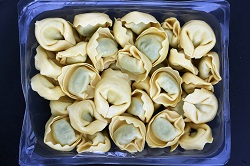Innovative food packaging extends shelf life, reduces footprint
The newly developed packaging material consists at least 75 % of raw materials from renewable sources. It includes different layers of bioplastics – PLA, PVOH and adhesives – and a wax coating produced from olive leaves. It is easy to recycle, presents excellent mechanical properties, is biodegradable and protects its content from oxygen and humidity, thereby preventing the development of bacteria and fungi. The project, which had a budget of EUR 1.5 million, was coordinated by AIMPLAS – a research technology centre located in Spain with 25 years of experience in plastics research and development. ‘The role of AIMPLAS in this project, besides coordinating it, has been focused on developing the biodegradable and oxygen-barrier material needed to comply with the final requirements of the food to be packaged, as well as being the responsible of processing the new materials developed to obtain the new multilayer packaging,’ Nuria López, main Researcher at AIMPLAS, explained. Brought together, the materials contained in the BIO4MAP’s packaging have a carbon footprint that is 57 % lower than that of materials traditionally use to pack cheese and fresh pasta. PLA boasts excellent mechanical properties and ease of recycling, whilst PVOH is a good gas barrier with water solubility: it disappears in the washing process, allowing PLA to be properly isolated and recycled. A wax coating processed by project partner Fraunhofer covers the external layer of the packaging, providing water vapour barrier and improving the flexibility of PLA. All these materials are joined by a new generation of biodegradable adhesives, which is one of the main innovations brought by BIO4MAP. While these materials were already commercially available, their processing as a coextrudate into a multilayer laminate had yet to be achieved. Altoni Pasta and Sachsenmilch are already counting on BIO4MAP’s solution to pack their products, whilst the inter-supplier of Mercadona, Central Quesera Montesinos, is contemplating it for the new packages of its cheesecake. All fresh food that requires a modified atmosphere packaging to be conserved is set to benefit from the use of this new packaging. Besides the above-mentioned partners, BIO4MAP also saw participation from Vallés Plàstic, which was responsible for applying the new coating, and Artibal, a manufacturer of waxes, lacquers and inks responsible of its formulation. The compounding company MAPEA has developed the biodegradable adhesive together with Finnish research centre Abo Akademi, and packaging transforming and manufacturing was handled by Bobino Plastique in France. For more information, please see: project website
Countries
Spain



